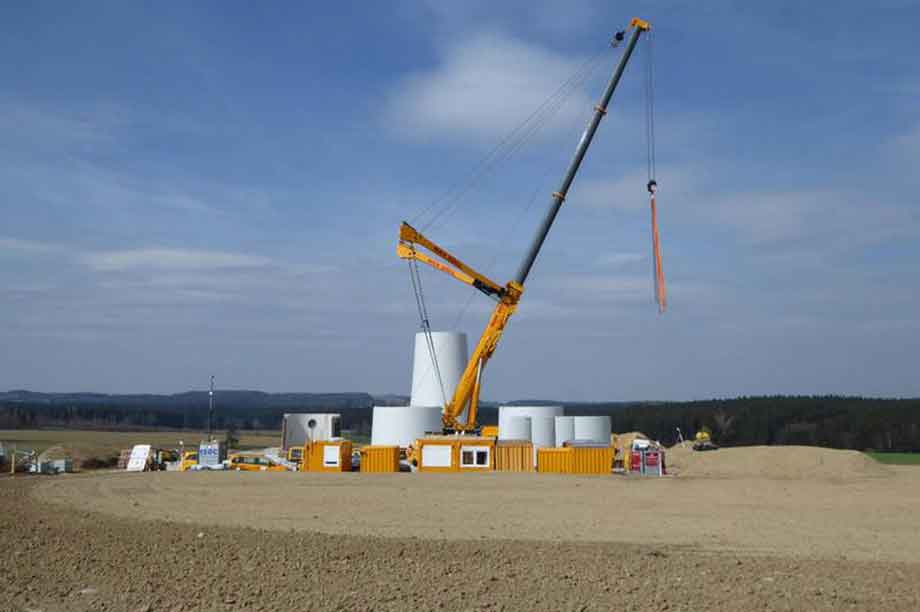The minsters are so worried about the impact on citizens’ initiatives to invest in wind farms they have sent a joint plea asking the federal economy ministry to reconsider the plans.
Onshore wind financing funds are a popular and flexible method used by German citizens’ initiatives to raise money to invest in small, local onshore wind developments.
But the German government’s planned competitive auction system from 2017, under which projects must bid a price per kilowatt hour to win support, could change all that. If citizens can no longer participate closely in local wind farms, there is concern that public acceptance of onshore wind energy will drop sharply.
Small projects
Onshore wind in Germany is very granular. Around 58% of the country’s 25GW onshore wind turbines are grouped in projects with fewer than seven turbines, according to the economy ministry. Of these, nearly 3,900 turbines are single, stand-alone projects.
The wind fund structure enables up to several hundred people from local communities and regions to participate in wind project finance for such projects.
Indeed, up to 90% of these small wind farms have been financed by funds structured as limited partnerships with a general partner, the latter usually being a limited company, which itself usually does not participate with an investment, according to Florian Bischof, a finance structuring expert for wind energy, at consultancy Aktiva.
Minimum sums generally range from €2,500 to €20,000, but structures have been developed — by local banks issuing wind savings-bonds for example — that allow much smaller contributions.
Local and regional interest in the limited partnerships is generally so high that most do not reach a broader public, Bischof said.
"It is good to closely involve local citizens in investment as they see and hear the turbines locally day to day," he added. The few well-publicised funds seeking investors, such as Windkraftfonds Lacuna Windpark Hohenzellig in northern Bavaria, are just the tip of the iceberg, he said.
The importance of local participation is underlined by Thiemo Allinger, managing director of Naturfinanz, an independent broker focused on citizen investments. "Local projects involving people, trades and industry from the municipality, as well as local or regional banks, are important for acceptance and expansion of onshore wind energy," he said.
"Wind power should belong to citizens. It is a business not for global or major companies but rather for decentralised, microcosmos-type businesses, which need secure and stable framework conditions."
If the German government introduces a competitive auction system from 2017, local wind initiatives are seriously hampered by their additional costs, warned Georg Hille, managing director of developer Ecovision, which specialises in citizens’ projects. The fund must be set up, voting structures created, and at least one annual meeting arranged for a single, often small project.
Setbacks also pose a greater risk for smaller companies, he added, citing one example of concerns for the single turbine SWE Burgerwindfund 1 citizens’ investment fund: lower-than-average wind speeds in southern Germany, partial turbine curtailment at night pending official turbine noise certification, and operating restrictions to protect bats.
The costs of drawing up the investment prospectus in line with federal financial rules, commercial operation costs, plus auditing and liability insurance can now add up to about 6-7% of revenues for this site, Hille said. Costs were around 4% in 2012 when the fund was initiated, now drive up by the German Small Investor Protection Act, which took effect in July, he said.
A pension-fund portfolio investment can shrink these costs to 1%, which individual citizens’ projects will find difficult to beat in an auction, even if they accept a lower rate of return than a pension fund, Hille said.
Hille is also in citizen participation in foreign projects for GIZ, the German Society for International Cooperation. "Wherever you have tendering procedures there is no citizens’ involvement," he said. "Auctions could be the death of citizens’ wind projects in Germany." He cautioned, too, against "alibi" citizens’ participations — restricted to less than 25% where, in practice, citizens have no influence.
States appeal
The state energy and climate ministers’ plea to the federal economy ministry last month pointed out that auctions can create "considerable obstacles" to citizens’ energy projects, and urged for citizens’ projects and other small players to be exempt from the auctions under the so-called de-minimis clause from the European Commission.
The federal economy ministry’s consultation on future competitive, auction rules is open until October.

.png)



.png)









